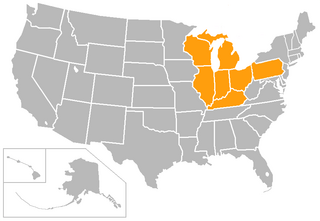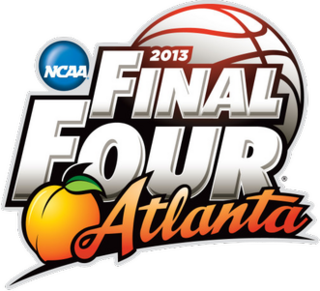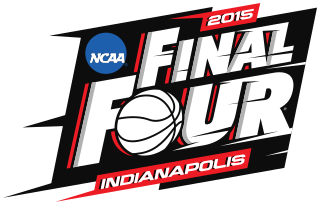Related Research Articles

The NCAA Division I men's basketball tournament, branded as March Madness, is a single-elimination tournament played in the United States to determine the men's college basketball national champion of the Division I level in the National Collegiate Athletic Association. Played mostly during March, the tournament consists of 68 teams and was first conducted in 1939. Known for its upsets of favored teams, it has become one of the biggest annual sporting events in the US.

The Horizon League is a collegiate athletic conference in the National Collegiate Athletic Association (NCAA) Division I. Headquartered in Indianapolis, the league's eleven member schools are located in and near the Great Lakes region.

A bracket or tournament bracket is a tree diagram that represents the series of games played during a knockout tournament. Different knockout tournament formats have different brackets; the simplest and most common is that of the single-elimination tournament. The name "bracket" is American English, derived from the resemblance of the links in the tree diagram to the bracket punctuation symbol ] or [. The closest British term is draw, although this implies an element of chance, whereas some brackets are determined entirely by seeding.
The selection process for college basketball's NCAA Division I Men's and Women's Basketball Tournaments determine which teams will enter the tournaments and their seedings and matchups in the knockout bracket. Currently, thirty-two (32) teams gain automatic entry through winning their conference's championship. The remaining teams rely on the selection committee to award them an at-large bid in the tournament. The selection process primarily takes place on Selection Sunday and the days leading up to it. Selection Sunday is also when the men's brackets and seeds are released to the public. Beginning in 2022, the women's championship brackets and seeds are also announced on Sunday. Prior to the expansion of the bracket from 64 to 68 teams the women's championship brackets and seeds were announced one day later, on Selection Monday.

The 2007 NCAA Division I men's basketball tournament involved 65 teams playing in a single-elimination tournament that determined the National Collegiate Athletic Association (NCAA) Division I men's basketball national champion for the 2006-07 season. The 69th annual edition of the tournament began on March 13, 2007, with the opening round game and concluded with the championship game on April 2, at the Georgia Dome in Atlanta, Georgia.

The 1978 NCAA Division I basketball tournament involved 32 schools playing in single-elimination play to determine the national champion of men's NCAA Division I college basketball. It began on March 11, 1978, and ended with the championship game on March 27 in St. Louis, Missouri. A total of 32 games were played, including a national third-place game.

The Dayton Flyers men's basketball team is a college basketball program that competes in NCAA Division I and the Atlantic 10 Conference (A-10) representing the University of Dayton in Ohio. The Flyers play their home games at University of Dayton Arena. The Flyers are coached by Anthony Grant who is in his seventh season. In March 2020, Dayton was ranked #3 in the AP Top 25 Poll, its highest ranking since the 1955–56 season when it was ranked #2. The Flyers have never been ranked #1, but Dayton did receive a lone first place vote in the final AP poll of the 2019–2020 season. When the 2020 seasons was cut short due to the COVID-19 pandemic, the Flyers did not get to participate in the 2020 NCAA Tournament, despite being projected as a #1 seed by several outlets.
ESPN College Basketball is a blanket title used for presentations of college basketball on ESPN and its family of networks. Its coverage focuses primarily on competition in NCAA Division I, holding broadcast rights to games from each major conference, and a number of mid-major conferences.

The 2012 NCAA Division I men's basketball tournament involved 68 teams playing in a single-elimination tournament that determined the National Collegiate Athletic Association (NCAA) Division I men's basketball national champion for the 2011-12 season. The 74th edition of the tournament began on March 13, 2012, and concluded with the championship game on April 2, at the Mercedes-Benz Superdome in New Orleans.

The 2013 NCAA Division I men's basketball tournament involved 68 teams playing in a single-elimination tournament that determined the National Collegiate Athletic Association (NCAA) Division I men's basketball national champion for the 2012-13 season. The 75th annual edition of the tournament began on March 19, 2013, and concluded with the championship game on April 8, at the Georgia Dome in Atlanta.
March Madness pools are a form of sports betting based on the annual NCAA Division I men's basketball tournament each spring in the United States. The annual tournament bracket can be completed online or printed out and completed by hand whereby, prior to the tournament, participants predict the outcome of each tournament game. Each participant's predictions are compared against the others in a given pool. Various scoring systems exist to award points for correct predictions, and various alternative games related to March Madness predictions exist. Tens of millions of brackets are filled out each year. Due to the size of the tournament and its proclivity for upsets, a perfect bracket has never been achieved.

The Saint Peter's Peacocks men's basketball team is the NCAA Division I intercollegiate men's basketball program that represents Saint Peter's University in Jersey City, New Jersey. The school's team competes in the Metro Atlantic Athletic Conference (MAAC) and plays their home games in Run Baby Run Arena. They are currently led by second-year head coach Bashir Mason, who was hired on April 12, 2022. The Peacocks have appeared in the NCAA tournament five times.

The 2015 NCAA Division I men's basketball tournament involved 68 teams playing in a single-elimination tournament that determined the National Collegiate Athletic Association (NCAA) Division I men's basketball national champion for the 2014–15 season. The 77th edition of the tournament began on March 17, 2015, and concluded with the championship game on April 6, at Lucas Oil Stadium in Indianapolis, Indiana.

The 2016 NCAA Division I men's basketball tournament involved 68 teams playing in a single-elimination tournament to determine the men's National Collegiate Athletic Association (NCAA) Division I college basketball national champion for the 2015–16 season. The 78th edition of the Tournament began on March 15, 2016, and concluded with the championship game on April 4, at NRG Stadium in Houston, Texas. This was the first NCAA tournament to adopt the NCAA March Madness branding, including fully-branded courts at each of the tournament venues.

The 2018 NCAA Division I men's basketball tournament was a single-elimination tournament of 68 teams to determine the men's National Collegiate Athletic Association (NCAA) Division I college basketball national champion for the 2017–18 season. The 80th annual edition of the tournament began on March 13, 2018, and concluded with the championship game on April 2, at the Alamodome in San Antonio, Texas.

The 2019 NCAA Division I men's basketball tournament involved 68 teams playing in a single-elimination tournament to determine the National Collegiate Athletic Association (NCAA) Division I men's basketball national champion for the 2018–19 season. The 81st annual edition of the tournament began on March 19, 2019, and concluded with the championship game on April 8, at U.S. Bank Stadium in Minneapolis, Minnesota, between the Texas Tech Red Raiders and the Virginia Cavaliers, with Virginia winning 85–77 in overtime.

The 2021 NCAA Division I men's basketball tournament was a single-elimination tournament of 68 teams to determine the National Collegiate Athletic Association (NCAA) Division I men's college basketball national champion for the 2020–21 season. The 82nd edition of the tournament began play on March 18, 2021, in sites around the state of Indiana, and concluded with the championship game at Lucas Oil Stadium in Indianapolis on April 5, with the Baylor Bears defeating the previously undefeated Gonzaga Bulldogs 86–70 to earn the team's first ever title.

The 2022 NCAA Division I men's basketball tournament involved 68 teams playing in a single-elimination tournament that determined the National Collegiate Athletic Association (NCAA) Division I men's college basketball national champion for the 2021–22 season. The 83rd annual edition of the tournament began on March 15, 2022, and concluded with the championship game on April 4 at the Caesars Superdome in New Orleans, Louisiana, with the Kansas Jayhawks defeating the North Carolina Tar Heels, 72–69, overcoming a 16-point first-half deficit, to claim the school's fourth national title.

The 2017–18 Buffalo Bulls men's basketball team represented the State University of New York at Buffalo during the 2017–18 NCAA Division I men's basketball season. The Bulls, led by third-year head coach Nate Oats, played their home games at Alumni Arena in Amherst, New York as members of the East Division of the Mid-American Conference. They finished the season 27–9, 15–3 in MAC play to win the MAC East Division and regular season championships. they defeated Central Michigan, Kent State, and Toledo to win the MAC tournament championship. As a result, they received the conference's automatic bid to the NCAA tournament. As the No. 13 seed in the South region, they upset Arizona in the First Round before losing to Kentucky in the Second Round.

The 2023 NCAA Division I men's basketball tournament involved 68 teams playing in a single-elimination tournament that determined the National Collegiate Athletic Association (NCAA) Division I men's basketball national champion for the 2022–23 season. The 84th annual edition of the tournament began on March 14, 2023, and concluded with the UConn Huskies defeating the San Diego State Aztecs, 76–59 in the championship game on April 3 at NRG Stadium in Houston, Texas.
References
- ↑ "NCAA Tournament Bracket Challenge 2021". Archived from the original on March 18, 2010.
- ↑ Roquemore, Bobbi (2006-02-06). "Bracket Buster loses meaning as field swells out of control". Milwaukee Journal Sentinel. Archived from the original on September 29, 2007. Retrieved 2007-02-18.
- ↑ ESPN BracketBusters Event Discontinued